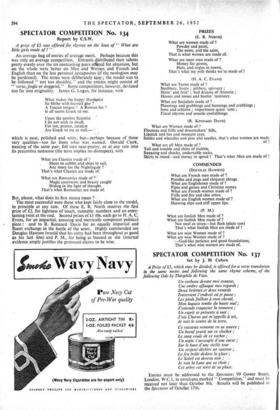SPECTATOR COMPETITION No. 134
Report by C.S.W.
A prize of £5 was offered for rhymes on the lines of " What are little girls made of ? "
An average bag of entries of average merit. Perhaps because this was only an average competition. Entrants tli.siributed their talents pretty evenly-over the six contrasting pairs diked for attention, but on the whole were better on Men and Women and French and English than on the less personal juxtaposites (if the neologism may be pardoned). The terms were deliberately easy ; the model was to be followed " not too slavishly," and the entries might consist of " verse, jingle or doggerel." Some competititors, however, deviated too far into originality. James G. Logan, for instance, with
What makes the happy HunAnist So blithe with learned glee ?
A Tuscan tongue ? A Roman fist ? It all seems Greek to me.
Upon the sombre Scientist I do not wish to dwell. For ion, proton, catalyst Are Greek to me as well.— which is neat, polished and witty, but—perhaps because of those very qualities—too far from what was wanted. Oswald Clark, treating of the same pair, fell into near-poetry, or at any rate into its penumbra nonsense (the term implies no disrespect), with What are Classics made of ?
Shoes to cobble and ships to sail,
' Any more for the Nightingale ? That's what Classics are made of.
What are Romantics made of Magic casements and beauty caught Hiding in the light of thought. That's what Romantics are made of.
But, please, what does its first stanza mean ?
The most successful were those who kept fairly close to the model, in principle at any rate. Of these E. R. North receives the first prize of £2, for lightness of touch, runnable numbers and an enter- taining twist at the end. Second prizes of £1 10s. each go to H. A. C. Evans, for an impartial, amusing and metrically competent political piece : and to R. Kennard Davis for an equally impartial and fluent exchange in the battle of the sexes. Highly commended are Douglas Hawson (would that his entry had been throughout as good as his last line) and P. M., for being as biassed as she (internal evidence amply justifies the pronoun) claims to be wise.
PRIZES
(E. R. NORTH)
What are women made of ? Powder and paint, The minx, and the saint, That is what women are made of.
What are mere men made_of ?
Money for gowns, Hats, and orgies in towns, That's what my wife thinks we're made of !
(H. A. C. EVANS) What are Tories made of ?
Snobbery, livery ; jobbery, spivvery ; Hirin' and firin' ; bad dreams of Aneurin ; Hosses and tosses and huntin' tantivery.
What are Socialists made of ?
Plannings and grabbings and bannings and crabbings ; Isms and schisms; impertinent quizz 'urns ; - Fiscal abysms and seaside confabbings.
(R. KENNARD DAVLS) What are Women made of ?
Flounces and frills and dressmakers' bills, Lipstick and lies and innocent eyes, Smiles and wheedles and pins and needles, that's what women are made What are all Men made of ? of !
Toil and trouble and chins of stubble, Swearing and shocks, undarnable socks,
Shirts to mend—and money to spend ! That's what Men are made of !
COMMENDED (DOUGLAS HAWSON)
What are French men made of ? Poodles and pugs and eloquent shrugs. What are Englishmen made of ? Pipes and games and Christian names. What are French women made of ? Frills and fire and chic attire.
What are English women made of ? Showing slips and stiff upper lips.
(P. M.) What are foolish Men made of ? What are foolish Men made of ? Not steel or straw—but flesh (plain raw) That's what foolish Men are made of
What are wise Women made of ? What are wise-Women made of ?
—God-like patience and good foundations, That's what wise women are made of.


































 Previous page
Previous page